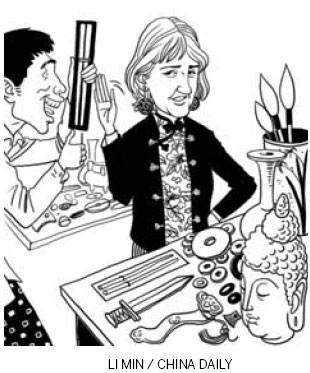After two decades in China, buying antiques remains my favorite game.
At Panjiayuan, Beijing, I was looking for a bronze Buddha's hand. I first visited the small shops around the market, stopping only where bronze pieces could be seen.
A man followed me; he addressed me in English. I smiled without answering, keeping my Chinese as a trump for later. In the shop, the saleswoman had something interesting but I wanted to see more choices.

As she opened the door to let me out, the man asked her: "What does she want to buy?" I answered before her, "Wo yijing maile, xiexie ni de guanxin. (I already bought something, thanks for your care.)" He understood I was not a newcomer and he would get no commission taking a customer to the right shop.
In the section where merchandise is spread out on the soil, I used only my eyes to detect a Buddha's hand. The merchants followed my eyes but could not guess what I was looking for. I remained silent, as I didn't want them to show me all kinds of Buddha statues.
"What does the lady want?" They asked each other. I heard hundreds of "look-a-look", but was not drawn by the hand or by vendors' arms around my shoulders as happens in other markets.
In the fourth row, I stopped in front of a tea pot, a kind I don't have in my collection, but heard a little voice inside: "You have no room for more teapots!" Having seen my interest, all the following vendors offered me their teapots.
I continued to walk slowly, eyes on a possible Buddha's hand, until I saw the most finely crafted pair of chopsticks, another article I collect. At that point I decided to open my mouth.
I thought they were ivory chopsticks but didn't want to play all my cards at once. "How much for your bone chopsticks?" I asked in Chinese.
After a short hesitation, the man showed three fingers. "Three hundred, hmm?" "Three thousand," he replied. "This is ivory!"
"Sorry, I can't buy such expensive articles," I said, putting them back.
The vendor would not let me go so easily. He asked how much I wanted to pay; I said that I didn't want to buy.
In fact, when buying antiques, I think there is no standard price, but a subjective value that is the price the collector feels reasonable relative to the degree of pleasure obtained from possessing the object.

Two alleys further on, I saw the chopsticks-man beside me, asking again how much I would pay. I tried to ignore him but he kept insisting. I finally said "200" in a way to get rid of him. He smiled shyly but didn't surrender. Several steps later he asked again, and I said I already answered his question. "Can you rise a little?" I just turned a deaf ear to him. "Okay, 200," he accepted.
As he had come down to my price, I should have bought; this is the market rule: Never announce a price if you have no intention to buy. But actually, the seller had not played a fair game.
I told him: "As you so easily dropped from 3,000 to 200 yuan, how can I believe you? Now, I know this is bone, not ivory. Sorry! Had you started at 400, it would have been different. Trying to trick the customer this way, you play against yourself."
However, it was not over yet. I had seen all the merchandise except the Buddha's hand I wanted.
|
|
|
|
|
|
|
|
